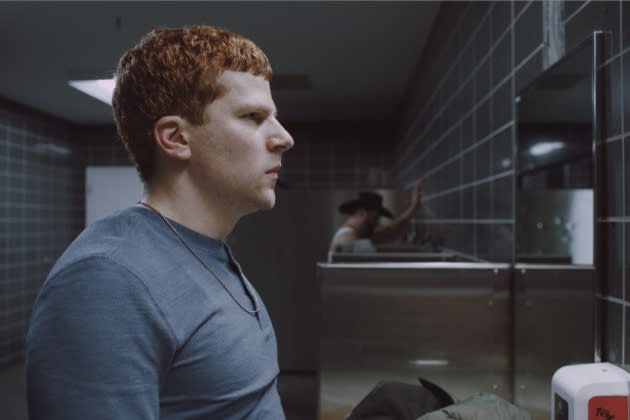‘Manodrome’ Review: Jesse Eisenberg Glowers His Way Through Reductive Look at Modern Masculinity
- Oops!Something went wrong.Please try again later.
- Oops!Something went wrong.Please try again later.
- Oops!Something went wrong.Please try again later.

The first rule of “Manodrome” is you don’t talk about “Fight Club.”
“Fight Club” looms large over writer-director John Trengrove’s unsettling second feature, even if no one overtly mentions David Fincher’s provocative late-’90s movie in this dark psychological-thriller-cum-social-critique, which finds the state of masculinity even more fraught than Fincher did a quarter-century ago. Trengrove, who is gay and hails from South Africa (his 2017 debut, “The Wound,” was shortlisted for the Oscar international prize), brings a queer sensibility to his otherwise unsatisfying analysis of contemporary manhood, enlisting Jesse Eisenberg to play yet another scrawny white guy seeking an outlet for deep wells of festering aggression.
More from Variety
Karisma Kapoor Talks Zee Studios' Berlin Series Show 'Brown' (EXCLUSIVE)
Boris Becker Serves up Candor at Berlin Event and in 'Boom! Boom!' Documentary
Here, he finds it in a secret society of like-minded dudes, spearheaded by Adrien Brody as a self-appointed father figure who calls himself “Dad Dan,” and who teaches Eisenberg’s character, Ralphie, to “man up.” In what feels like a case of lazy (type)casting, “Manodrome” finds its once-shrimpy star back in “The Art of Self-Defense” mode, embodying yet another variation on his now-familiar stunted/repressed man-boy persona — only this time, Eisenberg has hit the weights, bulging in ways he never did before.
Ralphie dedicates a lot of energy to working out. For him, the gym is like a microcosm of the world at large. It’s worth noting that the only woman to be seen in this space — the bodybuilder at the front desk — is five times as swole as Ralphie is. Obviously uncomfortable in his own skin, he glares at a muscular Black man doing curls at the neighboring station, or else cowers in an empty corner of the locker room. If you can guess where these behaviors are headed, then “Manodrome” isn’t nearly as sly as Trengrove thinks it is. The helmer has set out to shock and surprise, but the twists instead just feel rigged to reaffirm his own views of toxic masculinity.
“Manodrome” has more than a few parallels with the divisive Sundance entry “Magazine Dreams” (these movies all trace back to “Taxi Driver”). It’s a genre that shifts alongside society’s expectations of its men, and yet, without voiceover narration, such pent-up characters can often feel frustratingly inscrutable. Outside the gym, Ralphie works as an Uber driver, which is a constant source of humiliation — as when a young mother breast-feeding her baby in the back seat asks him to pull over when she catches Ralphie scoping her out in the rearview mirror. Was he being lecherous, or curious, or what? The character’s interior life isn’t well enough defined for audiences to interpret his inappropriate glance.
Relatively late in the film, we learn that Ralphie was abandoned by his father, which is just one of so many factors that explain the turmoil he’s now experiencing. It no doubt factors into his willingness to accept Dan as a replacement dad, but complicates the looming responsibility he must feel toward his unborn child. Snooping around the fancy Manodrome mansion — where other lost souls feel a sense of pseudo-familial support — Ralphie finds a gun in Dan’s desk drawer (likely stashed there by Chekhov). After rejecting so many other tired genre shortcuts, it’s a shame that Trengrove should fall back on this one.
Ralphie will eventually snap, of course, and when he does, the scene feels didactic and unconvincing. He shoots and kills someone for exposing in him a dimension that the film never adequately establishes, and here, “Manodrome” transitions from being an intriguing premise — a way of manifesting in the real world the kind of cult-like fraternities that seem to be brainwashing young men online — to a didactic lecture on what’s wrong with the state of modern masculinity. Sure, there’s a certain satisfying irony in positing that homophobia serves to mask unreconciled and shameful desire (as “The Power of the Dog” did with Benedict Cumberbatch’s character), but “Manodrome” doesn’t make a very convincing case.
The characters feel thin, the secret society seems implausible and its goals too vague to capture the imagination. “Manodrome” taps into a deep unease at play in the wider world, but it presents only the shell of an idea, focusing on a not-terribly-interesting character with only the haziest of goals. The film should be highly disturbing, but the dramatic tension never gels, despite composer Christopher Stacey’s efforts to unmoor us by injecting discordant strings beneath mundane scenes. The movie focuses on a man without much ambition swept up into a movement of similarly disenfranchised guys. They pledge voluntary celibacy and swear off the controlling influence of women.
Trengrove so clearly doesn’t identify with Ralphie that it’s hard for us to relate. And unless the movie’s willing to risk understanding the frustrations of men who cut themselves off from healthy relationships and instead seek companionship in shadowy groups like this, its “nothing a good hug wouldn’t cure” analysis feels reductive and unsatisfying.
Best of Variety
Sign up for Variety’s Newsletter. For the latest news, follow us on Facebook, Twitter, and Instagram.
